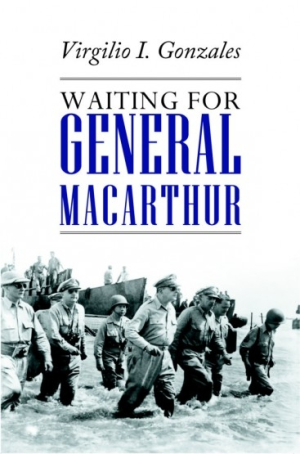Waiting for General MacArthur
Waiting for General MacArthur explores an often forgotten war front, illuminating the history of one of America’s most important Pacific allies.
How did the free people of Asia’s island nations experience the Second World War? In Waiting for General MacArthur, Virgilio I. Gonzales fictionalizes the experiences of a family’s struggle to survive the Japanese occupation of the Philippines.
The story opens just hours after the attack on Pearl Harbor, when Japanese aircraft bomb the Philippines, initiating an invasion that will last the duration of the war and force General MacArthur to retreat to Australia.
The story of the ensuing years is told largely through the eyes of Carlos, the youngest child in an extended family of twelve. Seeing the danger civilians are in, Carlos’s parents soon decide to leave Manila. While waiting for General MacArthur to fulfill his famous promise to return, the family lives in the woods, in villages and huts, and finally in Manila again, suffering the uncertainties and privations of war.
Though told in the third person, the prose strives to capture the flavor of a child’s sensibilities by using simple and sometimes repetitive sentences. Carlos loves the sea, the river, and any number of tasty dishes made by his mother, but none of these enumerations result in a clear picture of him.
He sometimes expresses insights beyond his years and at other times seems much younger than his age. His character remains elusive, while his dominating presence limits the narrative and keeps the story’s many other characters in the background.
Throughout much of the book, the writing does not live up to the drama of the plot. Discursive rambles and a tendency to round out scenes with hyperbolic statements blunt the impact of the unfolding action, as do asides such as a lengthy reverie on Carlos’s brother’s method of opening a can.
The narrative is at its most effective toward the end, when the story more clearly stands on its own merit. The discomfort and unpleasantness of waiting in line for rationed food are vividly portrayed, as is Carlos’s joy at seeing American planes overhead, followed by the pain of a final tragedy that arrives just when peace is in sight.
Virgilio I. Gonzales’s Waiting for General MacArthur explores an often forgotten war front, illuminates the history of one of America’s most important Pacific allies, and will no doubt be invaluable to descendants of the many Filipino civilians who found themselves suddenly living behind enemy lines.
Reviewed by
Susan Waggoner
Disclosure: This article is not an endorsement, but a review. The publisher of this book provided free copies of the book and paid a small fee to have their book reviewed by a professional reviewer. Foreword Reviews and Clarion Reviews make no guarantee that the publisher will receive a positive review. Foreword Magazine, Inc. is disclosing this in accordance with the Federal Trade Commission’s 16 CFR, Part 255.

